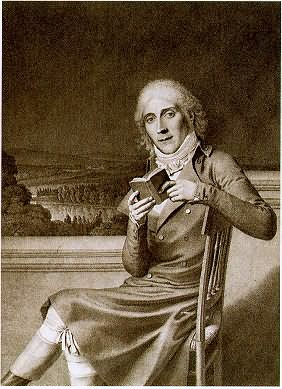Maine de Biran facts for kids
Quick facts for kids
Maine de Biran
|
|
|---|---|
 |
|
| Born |
François-Pierre-Gontier de Biran
29 November 1766 Grateloup (near Bergerac), Périgord
|
| Died | 20 July 1824 (aged 57) |
| Alma mater | University of Poitiers (LL.B.) |
| Era | Modern philosophy |
| Region | Western philosophy |
| School | French spiritualism |
|
Notable ideas
|
"Volo, ergo sum" |
|
Influences
|
|
|
Influenced
|
|
François-Pierre-Gontier de Biran (born November 29, 1766 – died July 20, 1824), known as Maine de Biran, was an important French philosopher. He is famous for his ideas about how our minds work, especially how we understand ourselves through our own actions and efforts.
Contents
Maine de Biran's Life Story
Maine de Biran was born in a place called Bergerac, France. He later added "Maine" to his name, which came from an estate nearby. He was a very good student and later joined the king's guards. He was even at the Palace of Versailles during some big events in October 1789, right before the French Revolution.
His Time in Politics
Maine de Biran also got involved in politics. In April 1797, he became part of the Conseil des Cinq Cents, which was a governing body in France. However, he had ideas that supported the king, which made the ruling group (called the Directory) unhappy. Because of this, he decided to leave politics for a while.
He went back to his family home in Grateloup. There, he stayed safe from the extreme parts of the French Revolution, known as the Reign of Terror. This quiet time allowed him to focus on his true passion: philosophy. He said he "jumped from being carefree to being a philosopher" during this period. He started by studying psychology, which became his main focus for the rest of his life.
After the Reign of Terror ended, Maine de Biran returned to politics. He was elected to the French parliament in 1812, 1815, and 1820. When the monarchy was restored in France, he became a treasurer for the chamber of deputies, which is like a part of the government. He would often go home to study during his breaks from work.
His Health and Changing Ideas
Maine de Biran was a sensitive person. He often thought about how his physical health affected his thoughts and feelings. Early in his career, he won an award for his essay on "habit" (how we form routines). But his ideas started to change. He began to disagree with some of the popular philosophical ideas of his time. Later in his life, he became more interested in Christianity and died as a faithful member of the Catholic Church.
He got married twice and had a son, Félix, and two daughters, Eliza and Adine. They all used the new surname Maine de Biran.
Maine de Biran's Philosophical Ideas
Maine de Biran didn't publish many of his writings during his lifetime. His essay on "habit" was one of the few. Many of his important works were published after he died. This allowed people to understand how his ideas developed over time.
How His Thinking Changed
His philosophy went through three main stages:
- Stage 1: The Philosophy of Sensation (up to 1804): At first, he believed that all our knowledge comes from our senses, like what we see, hear, or touch. This idea was similar to what other philosophers like John Locke believed.
- Stage 2: The Philosophy of Will (1804-1818): He soon realized that just receiving information from our senses wasn't enough to explain how our minds work. He started to focus on the idea of "effort" or "will." He believed that we truly know ourselves when we make an effort, like trying to move our hand or pay attention. When we feel resistance to our effort, we learn to tell the difference between ourselves (the "ego") and the world around us (the "non-ego"). This was a very important idea for him.
- Stage 3: The Philosophy of Religion (after 1818): In his later years, Maine de Biran's ideas became more spiritual. He believed that beyond our animal instincts and our human will, there was a third stage of life: a connection with God. He thought that through love and divine grace, our thoughts and actions could become part of a higher, spiritual life.
Maine de Biran's work is considered a very important example of deep philosophical thinking, especially about how our minds and experiences work. Even though his writing style was sometimes difficult, many people, like the philosopher Victor Cousin, considered him one of the greatest French philosophers of his time. His ideas were not fully recognized until after his death, when his writings were finally published.
His Writings
- Œuvres de Maine de Biran (edited by Pierre Tisserand, 1920–32)
- Vol. I.
- Vol. II.
- Vol. III.
- Vol. IV.
- Vol. V.
- Vol. VI.
- Vol. VII.
- Vol. VIII.
- Vol. IX.
See Also
 In Spanish: Maine de Biran para niños
In Spanish: Maine de Biran para niños
- Philipp Albert Stapfer
- James Mark Baldwin
- Implicit cognition
 | Aurelia Browder |
 | Nannie Helen Burroughs |
 | Michelle Alexander |


